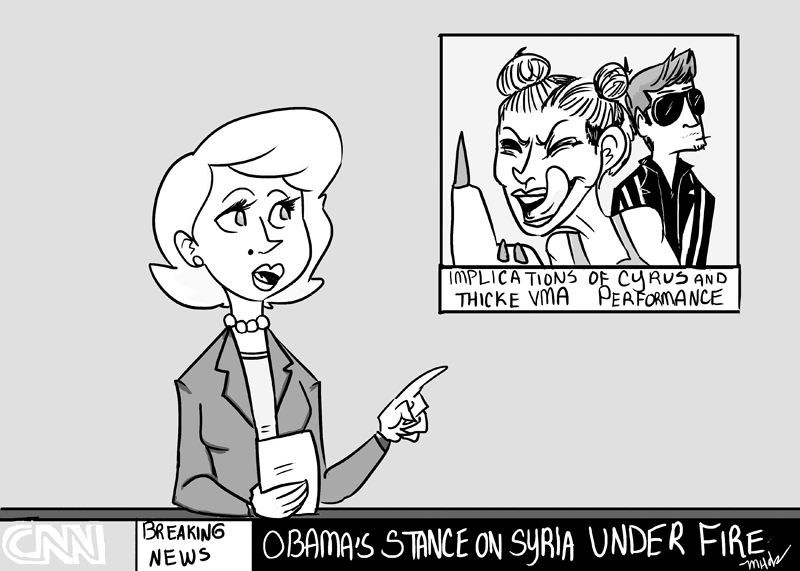Miley Cyrus’s tongue-writhing, glute-shaking VMA performance has exploded across the blogosphere in the past two weeks. Milliseconds after she strut forth from a giant teddy bear’s mouth, Facebook statuses and tweets began pouring from smartphones onto news feeds. Later, these initial judgments would be joined by articles comparing her overtly-sexual performance to earlier, more well-received acts by female artists like Britney Spears and Madonna. Other blog posts have analyzed her routine from sociological perspectives, trying to explain why the performance seemed so grotesque to so many people.
But for every tweet, article, status or blog post about Cyrus’ “We Can’t Stop,” there is the perennial reply: who cares?
This phrase is usually followed with the argument that Cyrus is a performance artist whose entire career depends on people talking about her. She is a brand and a label with her best advertising being gossip. She lives to shock people. Allowing ourselves to be shocked by her only gives her more notoriety and therefore more money and more tabloid headlines.
Chatter about a pop star’s shallow antics are therefore not only a waste of time but also something to be avoided because they encourage the “artist” to act in other superficially annoying ways.
Cyrus’ own comments validate this point of view. “What’s amazing now – it’s three days later, and people are still talking about it. They’re thinking over it. You’re thinking about it more than I thought about it when I did it,” she said in a video clip provided to MTV News by a documentary crew.
Even according to Cyrus herself, any analysis of her performance beyond a superficial level is reading too much into the situation. She is only there to entertain, not make you think. Were you not entertained?
The final argument of the person encouraging pop culture apathy is that these discussions distract the public from other, more important issues like the pending war with Syria or global poverty. Time wasted on Miley Cyrus could be spent raising awareness about a noble issue or reading up on more serious news. You could maybe even do your homework instead!
I usually share the feeling among my peers that a lot of American pop culture is shallow and does not represent me. I have never watched the VMAs and probably never will. I didn’t even know they were on until people on my news feed began posting about them.
Still, I see value in open dialogue about Cyrus’ performance. I think shutting down these conversations with phrases like “who cares?” or “this is stupid” is destructive.
Popular culture is popular. Meaning that a large percentage of the population is invested in it and enjoys it, regardless of how corporate our music industry has become or how similar many top 40 songs sound. Pop music sells because people like it. Therefore pop culture, especially pop music, is an outlet to reach a lot of people. Ideas and trends spread through pop music as easily as one catchy chord progression. At the same time, popular culture is a reflection of what the majority of the public like and find acceptable.
The fact that so many people found so much to talk about in the VMA performance shows that it was a subject worthy of discussion. It shows that, in that short exhibition and in the initial reaction to it, many members of the American public saw their own pop culture sending messages they did not agree with. They did not like it, and they did not like that it was formerly considered acceptable.
I saw people objecting to Cyrus’s overtly sexual performance, the way in which she uses black culture to enhance her image, her use of black women as “twerking” back-up dancers, other people “slut-shaming” Cyrus, the public attention on Cyrus instead of on Robin Thicke, who also performed a controversial song at the VMAs, and Cyrus’ status as a role model for many young women.
Individuals making these points are critiquing the society to which they belong and which they help create. They make these points in the hope of making it better, according to their own definition of “good.” Discussions like these are how we as individuals check the cultural balance between the ideas and values fed to us and the ideas and values we support. This back-and-forth can lead to positive change in our society.
Shutting down public discourse because it doesn’t affect you only limits the possibility of someone else making changes important to them. Conversations about Cyrus’ performance aren’t necessarily about her. Rather, they are about people discovering a disconnect between themselves and the culture with which they identify.
Telling others that there are “more important” things to talk about not only ignores other people’s experiences but also implies that shutting down one conversation is magically going to transfer that misspent energy to those other issues. If there are more serious topics of conversation that you find more important, then you can very easily talk about them yourself. People are not going to suddenly start chatting about foreign policy because you’ve told them that their own conversation is “stupid” and a “waste of time.”
We live in a society where speech is a protected freedom. Conversation is free, in both senses of the word, so why not have as much of it as possible?
So, who does care? Maybe not you, but definitely someone else.
Mary Claire Kelly is a College senior from Tucker, Ga.
Cartoon by Mariana Hernandez
The Emory Wheel was founded in 1919 and is currently the only independent, student-run newspaper of Emory University. The Wheel publishes weekly on Wednesdays during the academic year, except during University holidays and scheduled publication intermissions.
The Wheel is financially and editorially independent from the University. All of its content is generated by the Wheel’s more than 100 student staff members and contributing writers, and its printing costs are covered by profits from self-generated advertising sales.




